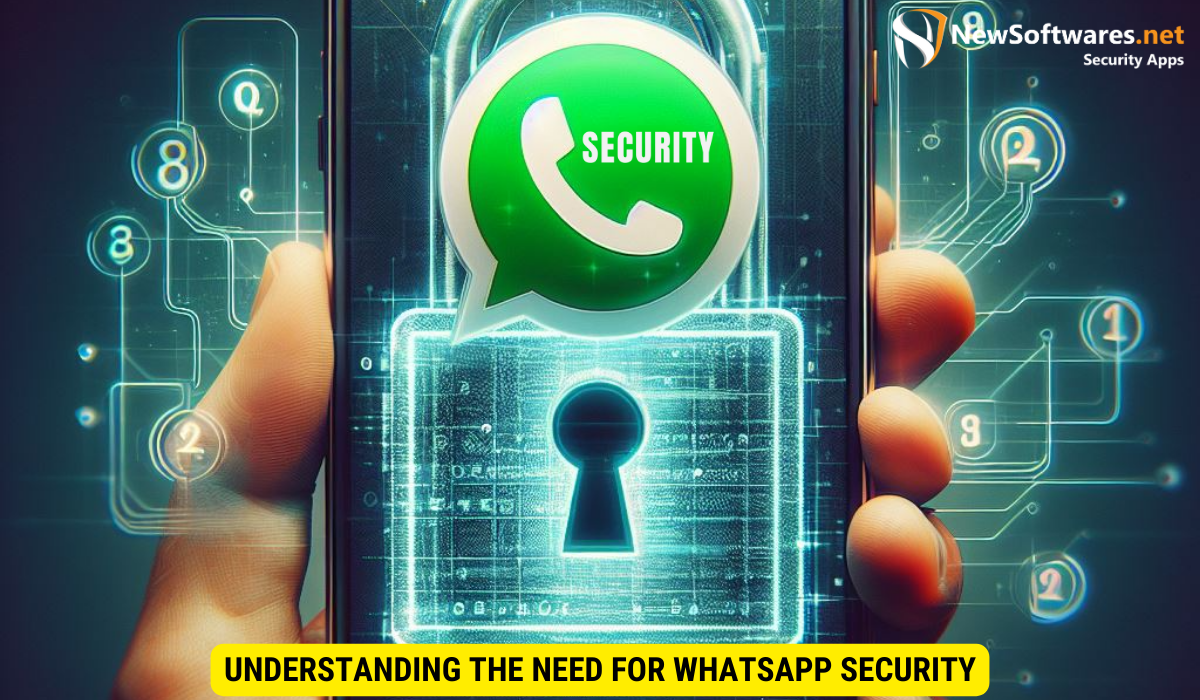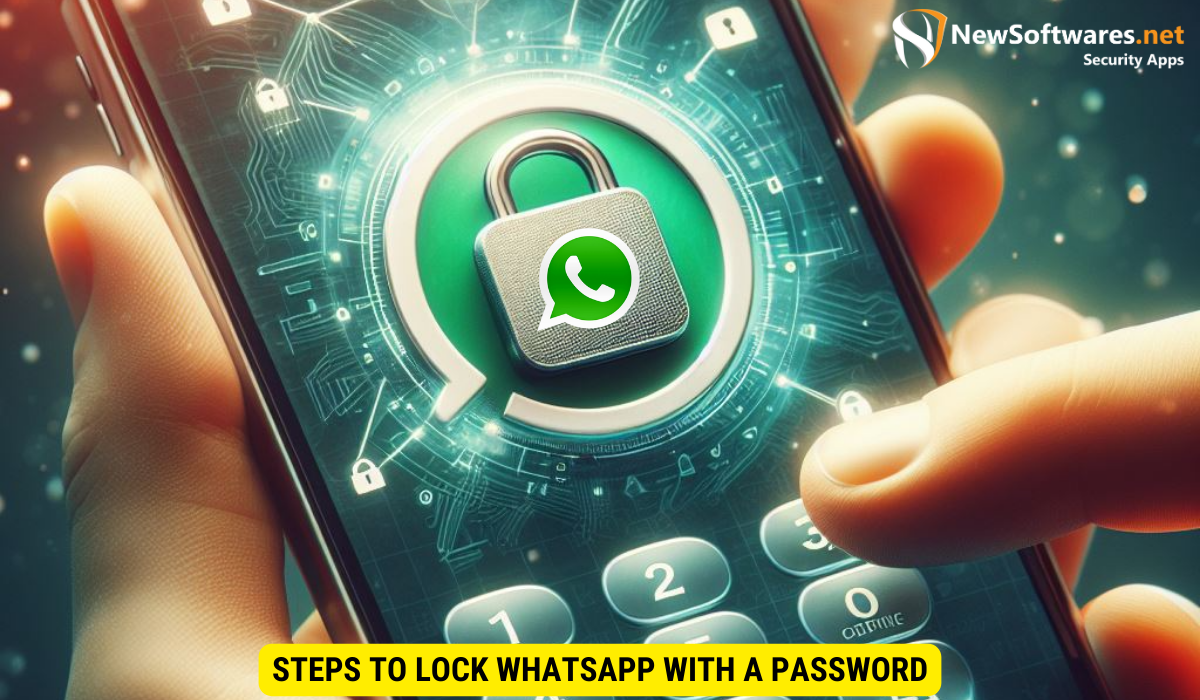To lock WhatsApp with a password on your iPhone, you can use the built-in Face ID or Touch ID feature. Here’s how you can set it up:
- Open WhatsApp: Tap on the WhatsApp icon on your iPhone to open the app.
- Go to Settings: In WhatsApp, go to the “Settings” tab located at the bottom right corner of the screen.
- Access Account Settings: Tap on “Account” to open the account settings.
- Go to Privacy: Select the “Privacy” menu to access privacy settings.
- Enable Screen Lock: Scroll down and find the “Screen Lock” option. Tap on it.
- Turn on Require Face ID or Touch ID: Toggle the switch to enable Face ID or Touch ID. This setting will lock WhatsApp and require biometric authentication to open it.
- Set the Duration: After enabling Face ID or Touch ID, you can select the duration after which WhatsApp will require authentication again. Options include “Immediately”, “After 1 minute”, “After 15 minutes”, or “After 1 hour”.
Once this feature is enabled, every time you open WhatsApp, it will require your Face ID or Touch ID to unlock. This adds an additional layer of security to your WhatsApp messages.
Note: If Face ID or Touch ID fails, you can also use your iPhone’s passcode to unlock WhatsApp. This feature is only available on iPhones that support Face ID or Touch ID.
In this digital age, privacy and security are of utmost importance. With the increasing use of messaging apps like WhatsApp for both personal and professional communication, it is essential to take steps to protect your conversations from prying eyes. I will guide you through the process of locking your WhatsApp with a password on your iPhone, ensuring that your messages remain private and secure.
Understanding the Need for WhatsApp Security

In today’s world, digital communication has become the norm. WhatsApp, with its user-friendly interface and end-to-end encryption, has emerged as one of the most popular messaging platforms. However, it is crucial to recognize the need for additional security measures to safeguard your conversations.
When it comes to securing your conversations on WhatsApp, it’s not just about protecting your privacy but also about ensuring the integrity and confidentiality of your messages. By implementing robust security measures, you can have peace of mind knowing that your communications are shielded from prying eyes and potential threats.
The Importance of Privacy in Digital Communication
Whether you are discussing personal matters or sharing sensitive business information, privacy is paramount. With hackers and cybercriminals becoming increasingly sophisticated, it is essential to take proactive steps to protect your conversations from unauthorized access.
Moreover, in today’s interconnected world, maintaining the privacy of your digital communications is not just a matter of personal security but also a legal and ethical responsibility. By prioritizing privacy in your online interactions, you demonstrate a commitment to upholding the trust and confidentiality of your conversations.
Risks of Unsecured WhatsApp Conversations
Without additional security measures, your WhatsApp conversations are vulnerable to various risks. These can include unauthorized access by others who may have physical or remote access to your iPhone, potential data breaches, or even accidental disclosure of sensitive information.
Furthermore, the consequences of leaving your WhatsApp conversations unsecured can extend beyond individual privacy concerns. In a professional setting, a breach of sensitive information can lead to financial losses, reputational damage, and legal implications. Therefore, it is imperative to be proactive in implementing security measures to mitigate these risks and protect both personal and professional interests.
Setting Up Your iPhone for Additional Security
Before diving into the process of locking your WhatsApp, it is essential to ensure that your iPhone is equipped with the necessary security measures to provide a solid foundation for protecting your conversations.
When it comes to safeguarding your iPhone, one of the most fundamental steps is to regularly update your device’s operating system. By keeping your iPhone’s operating system up to date, you are not only ensuring that you have access to the latest features but also crucially maintaining the highest level of security. These updates often include important security patches and bug fixes that address vulnerabilities that could potentially compromise the security of your device and its applications, including WhatsApp.
Updating Your iPhone’s Operating System
Regularly updating your iPhone’s operating system is crucial for maintaining the latest security patches and bug fixes. These updates often address vulnerabilities that could potentially compromise the security of your device and its applications, including WhatsApp.
Moreover, beyond just updating your iPhone’s operating system, it is equally important to explore and leverage the built-in security features that the device offers. These features can significantly enhance the overall security of your iPhone and the data stored on it.
Exploring iPhone’s Built-in Security Features
Alongside the operating system updates, your iPhone offers a range of built-in security features. These can include biometric authentication such as Face ID or Touch ID, device passcodes, and encryption capabilities. Familiarize yourself with these features and ensure that they are enabled to maximize the security of your device.
By taking the time to understand and utilize these security measures, you can create a robust defense against potential security threats and unauthorized access to your device and sensitive information. Stay proactive in managing your iPhone’s security settings to ensure a safe and secure digital experience.
Steps to Lock WhatsApp with a Password

Once you have established a strong security foundation on your iPhone, you are ready to proceed with locking your WhatsApp with a password.
Ensuring the privacy and security of your messaging app is crucial in today’s digital age. By adding an extra layer of protection through a password, you can safeguard your conversations and personal information from unauthorized access.
Navigating to WhatsApp’s Security Settings
To begin, open WhatsApp on your iPhone and navigate to the settings menu. Within the settings, locate the security options. Here, you will find the necessary settings to enable the password lock feature.
WhatsApp continuously updates its security features to adapt to evolving threats and user needs. By regularly checking and adjusting your security settings, you can stay ahead of potential vulnerabilities and ensure a safe messaging experience.
Creating a Strong Password for WhatsApp
When setting a password for WhatsApp, it is essential to create a strong and unique combination of alphanumeric characters. Avoid using easily guessable information such as your birthday or pet’s name. Consider using a password manager to generate and securely store your password.
Remember, a strong password is your first line of defense against unauthorized access. By incorporating a mix of uppercase and lowercase letters, numbers, and special characters, you can significantly enhance the security of your WhatsApp account.
Additional WhatsApp Security Tips
Locking your WhatsApp with a password is an excellent first step towards securing your conversations. However, there are additional measures you can take to enhance your WhatsApp security.
Enabling Two-Step Verification in WhatsApp
Two-step verification adds an extra layer of security to your WhatsApp account. This feature requires you to enter a unique PIN that is separate from your iPhone’s passcode when registering your phone number with WhatsApp. Enable this feature within the security settings of your WhatsApp account.
Regularly Changing Your WhatsApp Password
Periodically changing your WhatsApp password is a recommended practice to maintain the integrity of your security. Consider changing your password every few months or immediately if you suspect any security breaches or potential unauthorized access.
Troubleshooting Common Issues
While locking your WhatsApp with a password is generally a straightforward process, you may encounter some common issues along the way. Here are a few troubleshooting tips to help you overcome them.
What to Do When You Forget Your WhatsApp Password
If you forget your WhatsApp password, don’t panic. Simply follow the password recovery procedures within the WhatsApp app. This typically involves verifying your identity through alternative means such as email or phone number verification.
Resolving Technical Glitches During Password Setup
If you encounter any technical glitches while setting up the password lock feature, ensure that your iPhone’s operating system is up to date. Additionally, restarting your iPhone or reinstalling the WhatsApp app can often resolve such issues. If the problem persists, consider reaching out to WhatsApp customer support for further assistance.
Key Takeaways
- WhatsApp security is essential to protect your conversations from unauthorized access.
- Update your iPhone’s operating system and explore its built-in security features to strengthen the foundation of your device’s security.
- Create a strong and unique password for WhatsApp, and consider enabling additional security measures like two-step verification.
- Regularly change your WhatsApp password and take necessary steps to troubleshoot any issues that may arise.
- Locking your WhatsApp with a password provides an additional layer of security and ensures the privacy of your conversations.
FAQs
Can I lock WhatsApp on my iPhone without using a password?
No, to ensure the highest level of security, it is recommended to lock your WhatsApp with a password. This adds an extra layer of protection to your conversations.
Is it possible to use Face ID or Touch ID to lock WhatsApp on iPhone?
Currently, WhatsApp does not offer native support for Face ID or Touch ID. However, you can use these biometric authentication methods to secure your iPhone itself, which indirectly adds an extra layer of protection to your WhatsApp.
What should I do if someone gains unauthorized access to my WhatsApp?
If you suspect unauthorized access to your WhatsApp, immediately revoke access by changing your password. Additionally, consider enabling two-step verification and contact WhatsApp support for further assistance.
How frequently should I change my WhatsApp password?
To maintain the utmost security, it is recommended to change your WhatsApp password every few months or immediately if you suspect any security breaches or potential unauthorized access.
Are there any alternative messaging apps that offer better security than WhatsApp?
There are several messaging apps available that prioritize security and offer additional features. Signal and Telegram are two popular alternatives that provide strong encryption and security measures.
Conclusion
In conclusion, by following the steps outlined in this article, you can effectively lock your WhatsApp with a password on your iPhone. Taking the necessary precautions to protect your conversations not only ensures your privacy but also provides peace of mind in an increasingly digital world. Safeguard your WhatsApp today and communicate securely.
